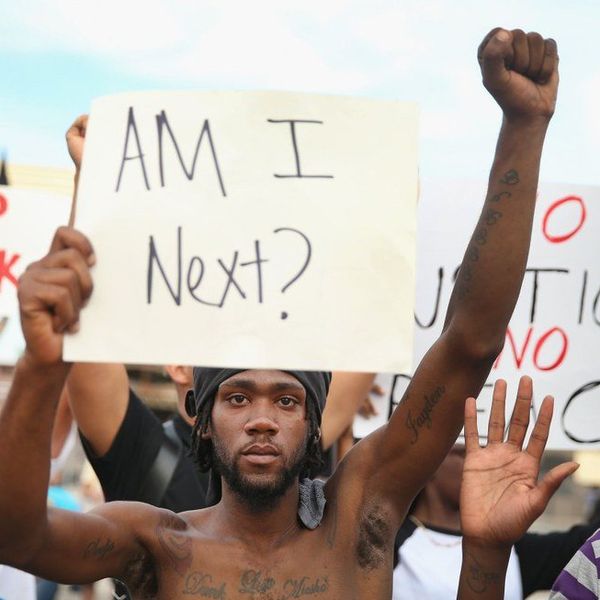The recent shootings of Alton Sterling and Philando Castile at the hands of police officers have shifted the national conversation again towards the Black Lives Matter movement, which seeks to hold law enforcement accountable for the disproportionate rate at which black people are killed by the police in this country. But in what appears to be a Black vs. White issue, what role do Asian Americans play?
Firstly, it's important to understand that Black Lives Matter is about more than just black lives. As public servants who are paid using tax payer money and are expected to carry around lethal weapons, American police officers should be held to a high standard. This includes making sure that shooting suspects isn't the go-to deescalation method of choice, and that there is absolutely, unequivocally, no way there is any bias, racial or otherwise, in the way they police.
However, though white people make up the majority of victims of police shootings (which makes sense considering they're the largest racial group in the country), African Americans are killed by law enforcement at a rate disproportionate to their share of the American population. For instance, despite comprising only 2% of the American population, African American males between the ages of 15 and 34 made up 15% of the victims killed by police officers in 2015. The vast majority of police officials may be men and women with difficult jobs who are doing their best to protect their communities, but you have to at least admit that the numbers point to some sort of systemic issue.
But how do Asian Americans fit into all of this? Well part of the reason why innocent African Americans often find themselves in violent confrontations with police officers is because they are generally perceived, both consciously and unconsciously, to be more dangerous than other suspects. And anti-Blackness within the Asian American community is without a doubt a contributing factor to this.
Asian Americans, and especially those of us that are first or second generation Americans, are no stranger to anti-Blackness within our own ethnic communities. Whether it be your grandma who tells you to stop sagging your pants "like a black guy", your aunt who is fine with whoever you marry "as long as they're not black", or your mom who gives you skin-lightening cream at the age of 8 because you're "looking a little dark", anti-Blackness is oftentimes a not-so-subtle part of our culture.
But how do you tackle something that is usually deeply ingrained within the older generations? After all, many of them never grew up around Black people, so does the fact that their perceptions have been shaped by negative media portrayals excuse their behavior? Sadly, no. And though you may not actively participate in it, sitting back silently is not good enough either. You're never too old to start unlearning bad behavior, and as the past few decades have shown us, racism does not magically go away by not talking about it. In exchange for taking up space in this country, you must accept the view that skin color does not determine one's worth. And if that means calling out your grandmother, then so be it.
Another factor that plays into Asian American silence on what are considered "Black" issues is the fact that many of us have come to embrace our role as the "model minority". The "model minority" is the idea that due to socioeconomic and/or educational success, a minority group, in this case Asian Americans, can be held up as the model for other minority groups to follow. To be sure, many Asian immigrants are proud of the title because they see it as a measure of how far they have come. And in all fairness, Asian Americans make up one of the most educated and affluent groups in the country, while retaining low crime rates. This leads us to believe that because of how well we're doing, we're immune to the issues that plague other ethnic groups.
The problem with this manner of thinking is that it erases not only the historical context of what it means to be Asian in America, but it also masks many of the problems that our community does face. Whether it be immigration quotas, the internment of Japanese-American citizens, or racial profiling, Asian Americans have their own unique ongoing history of discrimination in the United States. And to say that just because we "made it" means that we have no responsibility for calling out the injustices other groups face is to deny our own history. Just last year, 57 year-old Sureshbhai Patel was visiting his son in Madison, Alabama, from India when he was thrown to the ground by a police officer while out on a walk because of a tip called in about a suspicious-looking person "wearing a toboggan".
Patel was unable to communicate with the police officer because he does not speak English, and the encounter left him partially paralyzed. As of January this year, the officer in question has been cleared of federal charges. And even just a few days ago, an Emirati businessman wearing traditional dress was pinned to the ground and handcuffed in Ohio after a woman who overheard him speaking Arabic on the phone called in a tip saying he was "pledging allegiance to ISIS or something". Though the police department has since apologized for its mistake, it is clear to see that American police yet have a ways to go when it comes to dealing with Asian groups.
Ultimately, the problems Asian Americans and African Americans face in America are very different. However, the burden of fighting for social and institutional change cannot lie solely on the backs of those who are most affected. Even if it's just as allies, it is important that Asian Americans realize and understand the value of the Black Lives Matter movement. Because even our silence can be deafening.





















